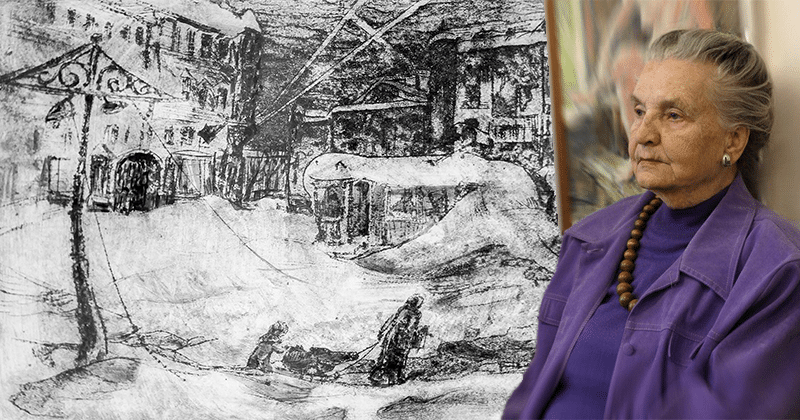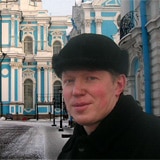Elena Oskarovna Martilla came of age as an artist during WWII in Leningrad. She created haunting images of the suffering the residents of that blockaded city lived through as well as proud images of their perseverance. Today, she is 98 years old and still producing art. The Russian Museum, one of the St. Petersburg’s largest and most prestigious museums, recently made the following short documentary about her. It is presented in slow, clear, simple Russian and thus perfect for students of the language who are interested in art or history.
The video does not include subtitles, but we have provided a short synopsis below as well in side-by-side translation so that students can prepare themselves to follow the video’s content and language. Also below are a few listening comprehension questions so that you can check to see how much you’ve understood!
Video: Elena Oskarovna Martilla. Art as an Expression of Life.
Video Synopsis in Side-by-Side Translation
| Елена Оскаровна Мартилла – художница родом из Ленинграда (сегодня – Санкт-Петербург). В июне 1941-го года 18-летняя Елена мечтала о поступлении в Академию художеств. Но мечта столкнулась с реальностью. Завтра была война. | Elena Oskarovna Martilla is an artist originally from Leningrad (today – St. Petersburg). In June 1941, Elena was 18 and dreamed of entering the Academy of Arts. But her dream collided with reality. Tomorrow was the war.* |
| В документальном фильме журналистка прошла путь, который Елена Оскаровна совершала во время самой страшной блокадной зимы 1941-1942 годов по дороге от своего дома на 18-й линии Васильевского острова до Таврической 35. Что же заставляло ее идти три часа в одну сторону? Как сообщается в фильме, для Елены Оскаровны это было возможностью реализовать ее мечту стать художником. | In the documentary, the journalist follows the path that Elena Oskarovna** made during the most terrible blockade winter of 1941-1942 on the way from her house on the 18th Line of Vasilyevsky Island to Tavricheskaya 35. What made her walk three hours in one direction? As the report details, this was an opportunity to realize her dream and become an artist. |
| Сколько себя помнит Елена Оскаровна, она всегда рисовала. | As far as Elena Oskarovna can remember, she has always painted and drawn. |
| Ее папа рано ушел из жизни. В фильме рассказывается что, когда она была ребенком, она нашла его фотографию. Чтобы сделать его «полным папой», она дорисовала на его фотографии руки и ноги. | Her dad passed away early. The report tells that, as a child, she found a photograph of him. To make a “full daddy,” she drew in arms and legs to his photograph. |
| С началом войны она окончила курсы медсестер Красного Креста и стала работать в детской больнице. И все же она не оставила своей мечты стать художником. | With the outbreak of the war, she completed Red Cross nursing courses and began working in a children’s hospital. And yet she did not give up her dream of becoming an artist. |
| В ноябре 1941 года Елена Мартилла поступает в Ленинградское художественное училище, расположенное по адресу Таврическая 35. Она ходила туда учиться рисовать и как студент получить рабочую карточку на 250 граммов хлеба. | In November 1941 Elena Martilla entered the Leningrad Art School, located at Tavricheskaya 35. She went there to learn to draw and paint and, as a student, to receive a work card for a ration of 250 grams of bread. |
| В своих рисунках Елена Мартилла показала наиболее выразительные моменты блокады Ленинграда, такие как погибший матрос, лежащий на Невском проспекте, голодающий студент. Она часто рисовала покосившийся столб с оборванными проводами – это образ ленинградца в блокаду, надломленного, застывшего, но державшегося. | In her drawings, Elena Martilla showed the most striking moments of the Leningrad Blockade, such as a dead sailor lying on Nevsky Prospekt, or a starving student. She often drew a lopsided post with torn wires – this was a symbol of a Leningrader in the blockade: broken, frozen, but holding on. |
| Елене Мартилла сейчас 98 лет. Искусство стало для нее всем, и самое яркое воспоминание в ее жизни – блокада Ленинграда. | Elena Martilla is now 98 years old. Art has been everything to her, and the most vivid memory in her life is the siege of Leningrad. |
*Tomorrow Was The War is the name of a popular Russian-language novel and movie in which the narrator speaks from the present about his past from just before WWII. As many in Russia also spoke about those days after the war, the phrase became an idiom used in the telling of such histories.
**Russian often uses the first name plus patronymic to refer to a person with respect. It will also sometimes use the first name plus last name, particularly to refer to an artist. Thus, remember that Elena Martilla and Elena Oskarovna both refer to Elena Oskarovna Martilla.
Listening Comprehension Questions
You Might Also Like
(May include current article)







